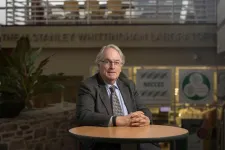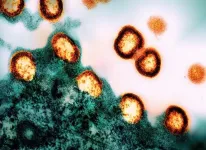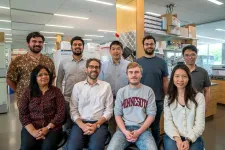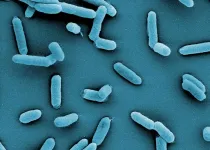(Press-News.org) Procrastination, the deliberate but detrimental deferring of tasks, has many forms. Sahiti Chebolu of the Max Planck Institute for Biological Cybernetics uses a precise mathematical framework to understand its different patterns and their underlying reasons. Her insights could help tailor individual strategies to tackle the issue.
“Why did I not do this when I still had the time?” – Whether it is filing taxes, meeting a deadline at work, or cleaning the apartment before a family visit, most of us have already wondered why we tend to put off certain tasks, even in the face of unpleasant consequences. Why do we make decisions that are harmful to us – against our better knowledge? This is precisely the conundrum of procrastination. Procrastination, the deliberate but ultimately detrimental delaying of tasks, is not only hampering productivity, but has also been linked to a host of mental health issues. So it is certainly worth asking why this much talked-about phenomenon has such a grip on us – and what it actually is.
“Procrastination is an umbrella term for different behaviors,” says computational neuroscientist Sahiti Chebolu from the Max Planck Institute for Biological Cybernetics. “If we want to understand it, we need to differentiate between its various types.” One common pattern is that we defect on our own decisions: we might, for example, set aside an evening for the tax return, but when the time has come we watch a movie instead. Something else is going on when we do not commit to a time in the first place: we might be waiting for the right conditions. The possible patterns of procrastination are myriad: from starting late to abandoning a task halfway through, Chebolu classified them all and identified possible explanations for each: misjudging the time needed or protecting the ego from prospective failure are just two of them.
The short-sighted brain
Can such a classification really help you get stuff done? Chebolu is convinced that a mathematically precise understanding of the mechanism at play is the first step to tackling it. She frames procrastination as a series of temporal decisions. What exactly happens, for example, when we schedule our tax declaration for Friday night but then succumb to the temptations of a streaming service? One way to think of decision-making is that our brain adds up all the rewards and penalties we expect to gain from the alternative behaviors: watching a movie or doing the annoying paperwork. Quite naturally, it then picks the course of action that promises to be most pleasant overall.
But does the fun of a movie night outweigh the dismay at a hefty failure-to-file penalty? There is one important detail: consequences in the distant future are weighted less by the brain in its summation of positive and negative outcomes. To a certain degree, this is normal and even useful; after all, the more distant future is necessarily fraught with uncertainties. “Only when we place excessive value on experiences in the present and not enough on those lying further ahead,” Chebolu explains, “such a decision-making policy becomes quickly maladaptive.”
Just lazy?
So much for the theory. To study real-life procrastination, Chebolu delved into large datasets provided by New York University. The data showed a log of students who were required to participate in a set number of hours of experiments over the course of a semester. Some rid themselves of the task right away; others distributed it evenly over several weeks – and, sure enough, still others shirked it until it was almost too late. Chebolu ran simulations to reproduce their behavior. Which explanations, she asked, would best be able to account for different pattern of procrastination?
It might be tempting to lay the blame on our brain’s preference for immediately rewarding activities. But there is definitely more at play: for each pattern of how the New York students deferred their task, Chebolu found multiple possible explanations. “Uncertainty is another major factor in procrastination,” she stresses. This could be the failure to predict how much time we will need to unearth all receipts for deductible expenses. But uncertainty can also mean lacking confidence in our own abilities or doubting whether the task helps us achieve our goals.
Chebolu is confident that understanding procrastination as a series of temporal decisions and detecting where and why we usually take a wrong turn can inform interventions: If you discover, for instance, that your brain is a bit too biased towards instant gratification, giving yourself short-term rewards might help. Those who tend to underestimate the time needed for their grunt work could try setting themselves time-bound goals. And if find yourself abandoning your chores quickly, you might want to avoid distracting environments.
No matter in which category of procrastination you fall (and you almost certainly fall into some of them sometimes): no, you are not just lazy. Recognizing this and forgiving yourself for procrastinating in past is a good first steps towards more productivity.
END
The science of procrastination
Understanding why we delay tasks may help reclaim productivity
2024-06-26
ELSE PRESS RELEASES FROM THIS DATE:
Saudi women’s quest for change enabled them earn citizenship rights
2024-06-26
Saudi women have obtained their citizenship rights through their own struggle and there is little truth in the widely held idea in the West that their role in the fight for their freedom has been negligible.
The finding is part of a new research in the journal Diogenes authored by Zahia Salhi, a professor at Sharjah University’s College of Arts, Humanities, and Social Sciences. The University of Cambridge Press has also posted Prof. Salhi’s research online.
“Far from being passive victims of their society, Saudi women are active agents ...
Introducing Sir Stanley: Binghamton University professor and Nobel Prize winner knighted by King Charles
2024-06-26
BINGHAMTON, N.Y. -- Binghamton University, State University of New York Distinguished Professor and Nobel Prize Laureate M. Stanley Whittingham has been named a Knight Bachelor “for his services to research in chemistry.”
The honor entitles him to be known as Sir Stanley, or Sir Stanley Whittingham, and was announced as part of King Charles III’s official birthday honours list.
In his 30-plus-year career, Whittingham has been a pioneer in the development of lithium-ion batteries, for which he won the Nobel Prize in Chemistry in 2019. ...
NIH statement on preliminary efficacy results of twice-yearly lenacapavir for HIV prevention in cisgender women
2024-06-26
The injectable antiretroviral drug lenacapavir was safe and 100% effective as long-acting HIV pre-exposure prophylaxis (PrEP) among cisgender women in a Phase 3 clinical trial, according to top-line findings released by Gilead Sciences, Inc., the study sponsor. Lenacapavir is administered every six months, making it the most durable HIV prevention method to have shown efficacy in this population. NIAID applauds the study sponsor, investigators, study staff, and—most importantly—the participants ...
Neurobiologist Joshua C. Brumberg named CUNY Graduate Center president
2024-06-26
The City University of New York has appointed Joshua C. Brumberg as president of the CUNY Graduate Center, making permanent a post he has held on an interim basis since October 2023. Brumberg, a neurobiologist who has been a faculty member, dean and researcher during his 22-year career at CUNY, will lead the University’s renowned center of graduate education, scholarship and public-interest research. CUNY’s Board of Trustees approved the appointment at its meeting last night.
“Dr. Brumberg has played a key role in expanding CUNY’s research enterprise over the past several years,” said Chancellor Félix V. Matos Rodríguez. “A ...
Cell division: Before commitment, a very long engagement
2024-06-26
Before a cell commits fully to the process of dividing itself into two new cells, it may ensure the appropriateness of its commitment by staying for many hours—sometimes more than a day—in a reversible intermediate state, according to a discovery by researchers at Weill Cornell Medicine. Their revelation of this fundamental feature of biology includes details of its mechanisms and dynamics, which may inform the development of future therapies targeting cancers and other diseases.
In their study, published June 26 in Nature, the researchers developed new tools allowing them to track over time the activation state of E2F, a ...
New tool enables faster, more cost-effective genome editing of traits to improve agriculture sustainability
2024-06-26
ST. LOUIS, MO, June 26, 2024 – With the goal of reducing the time and cost it takes to bring an improved crop to the marketplace, research conducted in the laboratory of Keith Slotkin, PhD, and his colleagues in the Plant Transformation Facility at the Donald Danforth Plant Science Center, was recently published in the scientific journal Nature. The publication Transposase-assisted target site integration for efficient plant genome engineering focuses on technology called TATSI (Transposase-Assisted Target Site Integration), which uses transposable elements to integrate custom DNA into specific sites in plant genomes.
The ...
Unlocking the world of bacteria
2024-06-26
Bacteria populate virtually every habitat on Earth, including within and on our own bodies. Understanding and engineering bacteria can lead to new methods for diagnosing, treating, and preventing infections. Additionally, it presents opportunities to protect crops from disease and create sustainable cell factories for chemical production, reducing environmental impact — just a few of the many benefits to society. To unlock these advantages, scientists need the ability to manipulate the genetic content of these bacteria. However, a longstanding bottleneck in genetically engineering bacteria has been the efficient ...
Argonne to support new AI for science projects as part of the National AI Research Resource Pilot
2024-06-26
The U.S. Department of Energy’s (DOE) Argonne National Laboratory will support three innovative artificial intelligence (AI)-driven science projects as part of the first round of awards from the National Artificial Intelligence Research Resource (NAIRR) Pilot.
Led by the National Science Foundation (NSF) in collaboration with DOE and several partners, the NAIRR Pilot aims to provide researchers and students with expanded access to key AI resources and data. NAIRR’s ultimate goal ...
Stress testing pension funds: Lithuanian researchers lead global innovation
2024-06-26
“We wanted to investigate how second pillar pension funds react to financial crises and how to protect them from the crises,” says Kaunas University of Technology (KTU) professor Dr Audrius Kabašinskas, who, together with his team, discovered a way to achieve this goal. The discovery in question is the development of stress tests for pension funds. Lithuanian researchers were the first in the world to come up with such an adaptation of the stress tests.
Stress tests are usually carried out on banks or other financial institutions to allow market regulators to determine and assess their ability to withstand adverse economic conditions.
According to the professor at ...
Multivitamin use and mortality risk in 3 prospective US cohorts
2024-06-26
About The Study: Multivitamin use was not associated with a mortality benefit in this cohort study of U.S. adults. Still, many adults report using multivitamins to maintain or improve health.
Corresponding Author: To contact the corresponding author, Erikka Loftfield, Ph.D., M.P.H., email erikka.loftfield@nih.gov.
To access the embargoed study: Visit our For The Media website at this link https://media.jamanetwork.com/
(doi:10.1001/jamanetworkopen.2024.18729)
Editor’s Note: Please see the article for additional information, including other authors, author contributions and affiliations, conflict of interest and financial disclosures, ...
LAST 30 PRESS RELEASES:
New study reveals how a key receptor tells apart two nearly identical drug molecules
Parkinson’s disease triggers a hidden shift in how the body produces energy
Eleven genetic variants affect gut microbiome
Study creates most precise map yet of agricultural emissions, charts path to reduce hotspots
When heat flows like water
Study confirms Arctic peatlands are expanding
KRICT develops microfluidic chip for one-step detection of PFAs and other pollutants
How much can an autonomous robotic arm feel like part of the body
Cell and gene therapy across 35 years
Rapid microwave method creates high performance carbon material for carbon dioxide capture
New fluorescent strategy could unlock the hidden life cycle of microplastics inside living organisms
HKUST develops novel calcium-ion battery technology enhancing energy storage efficiency and sustainability
High-risk pregnancy specialists present research on AI models that could predict pregnancy complications
Academic pressure linked to increased risk of depression risk in teens
Beyond the Fitbit: Why your next health tracker might be a button on your shirt
UCSB scientists bottle the sun with liquid battery
Lung cancer drug offers a surprising new treatment against ovarian cancer
When consent meets reality: How young men navigate intimacy
Siemens Healthineers and Mayo Clinic expand strategic collaboration to enhance patient care through advanced technology
Physicists develop new protocol for building photonic graph states
OHSU-led research initiative examines supervised psilocybin
New review identifies pathways for managing PFAS waste in semiconductor manufacturing
New research finds state-level abortion restrictions associated with increased maternal deaths
New study assesses potential dust control options for Great Salt Lake
Science policy education should start on campus
Look again! Those wrinkly rocks may actually be a fossilized microbial community
Exposure to intense wildfire smoke during pregnancy may be linked to increased likelihood of autism
Children with Crohn’s have distinct gut bacteria from kids with other digestive disorders
Genomics offers a faster path to restoring the American chestnut
Caught in the act: Astronomers watch a vanishing star turn into a black hole
[Press-News.org] The science of procrastinationUnderstanding why we delay tasks may help reclaim productivity







